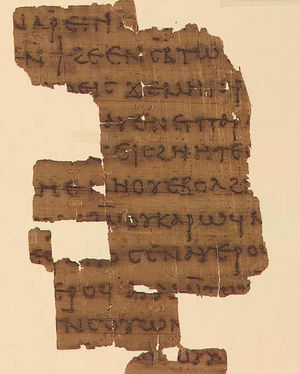Gnosticism: Difference between revisions
(Created page with "thumb|alt=caption|Papyrus fragment from the library of Gnostic texts found at Nag Hammadi, Egypt A term used to describe a diverse group o...") |
(saved temporarily) |
||
| Line 1: | Line 1: | ||
[[File:Dialogue of the Savior.jpg|thumb|alt=caption|Papyrus fragment from the library of Gnostic texts found at Nag Hammadi, Egypt]] | [[File:Dialogue of the Savior.jpg|thumb|alt=caption|Papyrus fragment from the library of Gnostic texts found at Nag Hammadi, Egypt]] | ||
Gnosticism is a term used to describe a diverse group of sects within Christianity that flourished in the second century, before the canon, doctrine and creeds of the Church were solidified. The Gnostics claimed to possess an advanced teaching that had been secretly handed down to them from Jesus and his close circle of disciples. | |||
Some Gnostics offered a radically different view of Jesus’ role and mission than did the churchmen of their day. Because the teachings of the Gnostics challenged the unity of the growing orthodox Church, Church leaders banned, suppressed and almost totally destroyed their scriptures. | Some Gnostics offered a radically different view of Jesus’ role and mission than did the churchmen of their day. Because the teachings of the Gnostics challenged the unity of the growing orthodox Church, Church leaders banned, suppressed and almost totally destroyed their scriptures. | ||
== Significance == | == Significance == | ||
| Line 21: | Line 11: | ||
The Ascended Lady Master [[Thérèse of Lisieux]] comments on the significance of the teachings of the Gnostics: | The Ascended Lady Master [[Thérèse of Lisieux]] comments on the significance of the teachings of the Gnostics: | ||
<blockquote>The Gnosticism that has been discovered in this "library in a jar" at Nag Hammadi in 1945 is certainly not the final word, is certainly not the perfected doctrine, but the elements within it reveal clearly that which was banned as heresy by the Church Fathers; and by their banning of this true teaching of Jesus, they have denied our Lord’s doctrine to all the faithful these seventeen hundred years or more.</blockquote> | |||
<blockquote>Know, then, beloved, that Christ has indeed long ago been put out of this Church and that Christ resides only in the pure hearts of those who are within it, and some of these pure hearts have risen to the position of pope and high office and some have been the humble of no particular stature. Therefore they in their hearts of fire rather than through an organization or a doctrine have kept alive the true Presence of Jesus [on earth and, coincidentally, within the Church].<ref>Thérèse of Lisieux, {{POWref|31|39}}</ref></blockquote> | |||
== Sources == | == Sources == | ||
Revision as of 22:51, 26 June 2016

Gnosticism is a term used to describe a diverse group of sects within Christianity that flourished in the second century, before the canon, doctrine and creeds of the Church were solidified. The Gnostics claimed to possess an advanced teaching that had been secretly handed down to them from Jesus and his close circle of disciples.
Some Gnostics offered a radically different view of Jesus’ role and mission than did the churchmen of their day. Because the teachings of the Gnostics challenged the unity of the growing orthodox Church, Church leaders banned, suppressed and almost totally destroyed their scriptures.
Significance
The Ascended Lady Master Thérèse of Lisieux comments on the significance of the teachings of the Gnostics:
The Gnosticism that has been discovered in this "library in a jar" at Nag Hammadi in 1945 is certainly not the final word, is certainly not the perfected doctrine, but the elements within it reveal clearly that which was banned as heresy by the Church Fathers; and by their banning of this true teaching of Jesus, they have denied our Lord’s doctrine to all the faithful these seventeen hundred years or more.
Know, then, beloved, that Christ has indeed long ago been put out of this Church and that Christ resides only in the pure hearts of those who are within it, and some of these pure hearts have risen to the position of pope and high office and some have been the humble of no particular stature. Therefore they in their hearts of fire rather than through an organization or a doctrine have kept alive the true Presence of Jesus [on earth and, coincidentally, within the Church].[1]
Sources
Elizabeth Clare Prophet, Kabbalah: Key to Your Inner Power, chapters 2 and 3.
Elizabeth Clare Prophet with Erin L. Prophet, Reincarnation: The Missing Link in Christianity.
- ↑ Thérèse of Lisieux, Pearls of Wisdom, vol. 31, no. 39.
